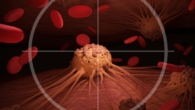
Named a type of pepper that helps protect against diabetes and heart disease
0
Using chili peppers improves the body's protection against the development of diabetes and heart disease, say researchers.
Scientists have called chili pepper a “small product” that has the ability to reduce the risk of diabetes and heart disease. The conclusion that “spicy red food can prevent these two potentially fatal diseases” was made by a research group led by Dr. Kiran Ahuja.
Experts explain the healing effect of this type of pepper to the content of active ingredients capsaicin and dihydrocapsaicin.< /p>
Protection against heart disease. When it comes to heart disease, the capsaicin and dihydrocapsaicin in chili peppers can reduce the buildup of fatty deposits on artery walls, thereby preventing blood clots, experts say. They remind that fatty deposits and blood clots are key factors in a person's predisposition to cardiovascular pathologies.
“Chili pepper can reduce the oxidation of “bad” cholesterol, reducing the formation of plaques in the arteries,” – say the researchers.
>
Their conclusion echoes the data of the study, the results of which were published in the Journal of the American College of Cardiology. According to these data, eating chili peppers at least four times a week reduces the risk of death from coronary heart disease by 44%.
Protection against diabetes. This type of pepper also helps protect against diabetes (especially preventable type 2 diabetes). One of the main problems associated with type 2 diabetes is high blood sugar, the result of insulin produced by the pancreas not working properly or not having enough of it.
Research has shown that that eating foods containing chili peppers correlates with lower blood sugar and postprandial insulin concentrations.
“Based on our previous research, we expect that chili pepper consumption by people with impaired tolerance to glucose and type 2 diabetes will provide a significant improvement in postprandial blood glucose, insulin and other risk factors for diabetes and heart disease,” said the project manager, Dr. Ahuja.









Leave a Reply